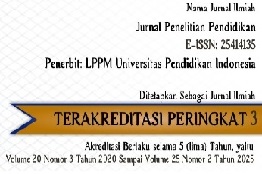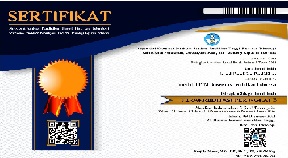The Impact of Locus of Control And Technological Self-Efficacy in Learning Outcomes of Public High School Students in Bandung City
Abstract
Keywords
Full Text:
PDFReferences
Atwell, Mrusek, Solti, Wilson. (2021). Risks to Student Achievement in Higher Education. AHFE: Advance in Human Factors in Training, Education, and Learning Sciences doi: 10.1007/978-3-030-80000-0_20
Arinanda, P., Fasari, Y., Utomo, S. W., & Styaningrum, F. (2021). Pengaruh Locus of Control Dan Motivasi Belajar Terhadap Hasil Belajar. JAMER: Jurnal Ilmu-Ilmu Akuntansi, 2(1), 39–42. http://mail.unmermadiun.ac.id/index.php/jamer/index
Astuti, P. (2020). Relationship Between Motivation and Discipline of Students to Student Learning Outcomes First GradeI Vocational High School. doi: 10.29240/EF.V4I1.951
Compeau, D., & Higgins, C. (1995). Computer Self-Efficacy: Development of a Measure and Initial Test. MIS Quarterly, 19, 189-211. https://doi.org/10.2307/249688
Darwanto, D. (2022). Korelasi Sikap Belajar Dengan Hasil Belajar Siswa. Eksponen, doi: 10.47637/eksponen.v12i1.516
Darwin, M. (2021). Metode Penelitian Pendekatan Kuantitatif (T. S. Tambunan, Ed.). CV. MEDIA SAINS INDONESIA. www.penerbit.medsan.co.id
Dhila, Ramdhani, Setiawati. (2023). Hubungan antara Locus Of Control dengan Kematangan Karier pada Mahasiswa: Tinjauan Literatur Sistematis. Edu Consilium, doi: 10.19105/ec.v4i1.8078
Drago, A., Rheinheimer, D. C., & Detweiler, T. N. (2018). Effects of Locus of Control, Academic Self-Efficacy, and Tutoring on Academic Performance. Journal of College Student Retention: Research, Theory and Practice, 19(4), 433–451. https://doi.org/10.1177/1521025116645602
Fuhai, Xi, Zhang. (2022). Relationship between Technology Acceptance and Self-Directed Learning: Mediation Role of Positive Emotions and Technological Self-Efficacy. Sustainability (Switzerland), 14(16). https://doi.org/10.3390/su141610390
Gagné, Robert, M.,. (1972). Domains of learning. Interchange, doi: 10.1007/BF02145939
Hermann, Mucke. (2023). Investigating Latent Interactions between Students’ Affective Cognition and Learning Performance: Meta-Analysis of Affective and Cognitive Factors. Behavioral sciences, doi: 10.3390/bs13070555
Jacqueline, Ancess. (2000). The Reciprocal Influence of Teacher Learning, Teaching Practice, School Restructuring, and Student Learning Outcomes. Teachers College Record, doi: 10.1111/0161-4681.00069
Jan, S. K. (2015). The relationships between academic self-efficacy, computer self-efficacy, prior experience, and satisfaction with online learning. American Journal of Distance Education, 29(1), 30–40. https://doi.org/10.1080/08923647.2015.994366
Joakim, Caspersen., Jens-Christian, Smeby. (2018). The relationship among learning outcome measures used in higher education. Quality in Higher Education, doi: 10.1080/13538322.2018.1484411
Joo, Y. J., Lim, K. Y., & Kim, J. (2013). Locus of control, self-efficacy, and task value as predictors of learning outcome in an online university context. Computers and Education, 62, 149–158. https://doi.org/10.1016/j.compedu.2012.10.027
Kurniawati, H., & Liana, C. (2022). Pengaruh Efikasi Diri (Self Efficacy) Terhadap Hasil Belajar Sejarah Siswa Kelas XI IPS MAN 1 Bojonegoro. Journal Pendidikan Sejarah, 12(1).
Lase, D. (2019). Pendidikan di Era Revolusi Industri 4.0. SUNDERMANN: Jurnal Ilmiah Teologi, Pendidikan, Sains, Humaniora Dan Kebudayaan, 12(2), 28–43. https://doi.org/10.36588/sundermann.v1i1.18
Leomar, Galicia. (2023). Technological Self-efficacy, Learning Motivation, and Selfdirected Learning of Selected Senior High School Students in a Blended Learning Environment. Technium Social Sciences Journal, doi: 10.47577/tssj.v44i1.8980
Maulana, N. (2018). Pengaruh Konsep Diri dan Locus of Control Terhadap Hasil Belajar Siswa Pada Mata Pelajaran Ekonomi. Universitas Pendidikan Indonesia.
Mehboob, Ul, Hassan., Rafaqat, Ali, Akbar. (2020). Locus of Control: Teachers' Neglected Attribute towards Students' Achievement Scores in Facing Diverse Socioeconomic Status.. doi: 10.33225/PEC/20.78.282
Millenia, Taufik. (2023). Hubungan Locus of Control dengan Kematangan Karier Siswa Hasil Belajar Rendah. Jurnal Neo Konseling, doi: 10.24036/00711kons2023
Nargis, Ashiq, Abbas. (2020). Mediating Effect of It Tools Usage on the Relationship Between Academic Self-efficacy, Learning Attitude and Academic Performance. doi: 10.47067/RAMSS.V3I3.72
Neal, J., Enright. (2023). Perspective Chapter: Impact of COVID-19 on Learning Outcomes of Students. doi: 10.5772/intechopen.107390
Neha, Abraham, Rajalakshmi. (2021). Self-Efficacy and Locus of Control Among School Students. doi: 10.25215/0903.001
Pratiwi, Neviyarni., Solfema. (2018). Contribution self efficacy and independent learning math toward students' mathematics learning outcomes. doi: 10.29210/2018199
Rafidatul, Afakhrul, Masub, Bakhtiar. (2022). Pengaruh penggunaan metode fun learning untuk menumbuhkan semangat siswa kelas iii upt sdn 23 gresik. Didaktik: Jurnal Ilmiah PGSD STKIP Subang, doi: 10.36989/didaktik.v8i2.527
Rahman., Bhuiyan, Hossain., Sifa. (2023). Impact of technology self-efficacy on online learning effectiveness during the COVID-19 pandemic. Kybernetes, doi: 10.1108/k-07-2022-1049
Rashi, Malik. (2023). Impact of Technology-based Education on Student Learning Outcomes and Engagement.
Riduwan, & Kuncoro. (2012). Cara Menggunakan dan Memakai Path Analysis. Alfabeta.
Rotter, J. B. (1966). Generalized Expectancies for Internal Versus External Control of Reinforcement. Psychological Monographs: General and Applied, 80(1).
Saville, Foster. (2021). Does technology self-efficacy influence the effect of training presentation mode on training self-efficacy?. doi: 10.1016/J.CHBR.2021.100124
Sinaga, D. (2014). Statistika Dasar. UKI PRESS.
Stephanie, Bowden, Brock, Bunch. (2020). Teacher dispositions as predictors of technology integration: a changing tide. International journal of business, doi: 10.33642/IJBASS.V6N1P2
Sugiyono. (2013). Metode Penelitian Kuantitatif, Kualitatif Dan R&D (19th ed.). ALFABETA.
Syatriadin. (2017). Locus of Control : Teori Temuan Penelitian dan Reorientasinya dalam Manajemen Penanganan Kesulitan Belajar Peserta Didik. doi: 10.36088/FONDATIA.V1I1.93
Syatriadin. (2017). Locus of Control : Teori Temuan Penelitian dan Reorientasinya dalam Manajemen Penanganan Kesulitan Belajar Peserta Didik. doi: 10.36088/FONDATIA.V1I1.93
Taherdoost, H. (2019). What Is the Best Response Scale for Survey and Questionnaire Design; Review of Different Lengths of Rating Scale, Attitude Scale, Likert Scale. International Journal of Academic Research in Management.
Uldana, Baizyldayeva. (2020). How Social Media Usage Influences Student Learning Outcomes. doi: 10.4018/978-1-7998-2551-7.CH011
Uus, Rahmat, Kurniawan. (2019). The important of self-efficacy and self-regulation in learning: How should a student be?. doi: 10.1088/1742-6596/1157/2/022074
Wang, C. H., Shannon, D. M., & Ross, M. E. (2013). Students’ characteristics, self-regulated learning, technology self-efficacy, and course outcomes in online learning. Distance Education, 34(3), 302–323. https://doi.org/10.1080/01587919.2013.835779
Yarmis, Tania, Nuzila, Zahri. (2019). Student’s Problems Learning and Guidance Counseling Services in the Era of Industrial Revolution 4.0. doi: 10.2991/ICET-19.2019.174
Ziblim, Mohammed, Mashoud, Andani. (2020). Academic Outcomes of High School Students in Northern Ghana: The Mediator Role of Locus of Control. Journal of Educational and Social Research, doi: 10.36941/JESR-2020-0011
DOI: https://doi.org/10.17509/jpp.v23i3.66457
Refbacks
- There are currently no refbacks.
Copyright (c) 2024 Jurnal Penelitian Pendidikan
ISSN: p.1412-565X e.2541-4135
Jurnal Penelitian Pendidikan (JPP), Universitas Pendidikan Indonesia 
This work is licensed under a Creative Commons Attribution-ShareAlike 4.0 International License
Statcounter


